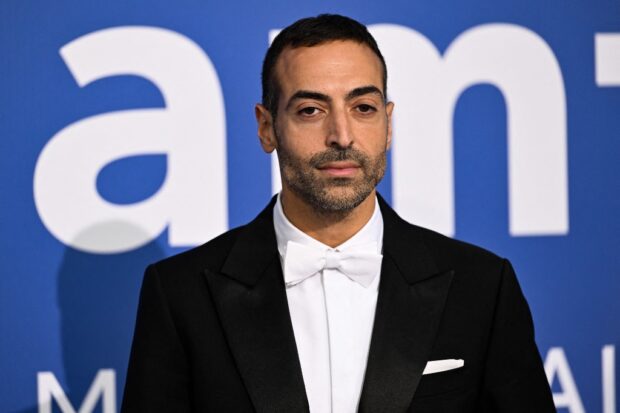The growing soft power of Saudi Arabian cinema

Saudi Arabian film producer Mohammed Al Turki arrives to attend the annual amfAR Cinema Against AIDS Cannes Gala at the Hotel du Cap-Eden-Roc in Cap d’Antibes, southern France, on the sidelines of the 76th Cannes Film Festival, on May 25, 2023. Al Turki, 36, heads Saudi Arabia’s Red Sea Film Foundation and is one of cinema’s most powerful men, representing a country where cinemas were banned until five years ago. STEFANO RELLANDINI / AFP
CANNES, France—Accompanying Naomi Campbell on the red carpet at the Cannes Film Festival last week was one of cinema’s most powerful men—and he represents a country where cinemas were banned until five years ago.
Mohammed Al Turki, 36, heads Saudi Arabia’s Red Sea Film Foundation, his name splashed all over posters and movie credits at the world’s biggest cinema gathering on the French Riviera.
The foundation, formed two years ago, holds its own annual festival and has already financed 168 movies, including eight in the official selection at Cannes this year.
Among them was festival opener “Jeanne du Barry” about a French prostitute falling in love with King Louis XV, played by Johnny Depp.
Others seemed equally at odds with traditional Saudi values—female-focused films such as “Four Daughters” about the religious radicalization of Tunisian girls, or “Goodbye Julia” about a Sudanese woman and her overbearing conservative husband.
“We have learned to respect other cultures,” Emad Iskandar, director of the Red Sea Film Foundation, told AFP.
He said the foundation focuses on Arab and African filmmakers, though the precise definition seems flexible: the French director of “Jeanne du Barry”, Maiwenn, qualified thanks to her Algerian father.
“As long as we have the resources, we want to serve the region, but also take the opportunity to learn more,” Iskandar added.
Al Turki’s foundation also sponsored a gala for women, attended by Catherine Deneuve, Katie Holmes and supermodel Campbell.
“MO!! Proud of all your doing @redseafilm creating history of many 1st’s and Changing the narrative,” Campbell wrote of Al Turki on her Instagram.
Whitewashing?
Saudi largesse for the arts has boomed under the kingdom’s de facto ruler, Crown Prince Mohammed bin Salman, with billions pouring into previously taboo areas such as music, fashion and sports.
Human Rights Watch says this is designed to “whitewash its dismal rights record” and that, despite recent reforms, Saudi Arabia continues to repress civil society, execute dissidents, discriminate against women and bury the investigation into the 2018 murder of journalist Jamal Khashoggi.
But most Saudis back the reforms, and its officials say it is absurd to expect the kingdom to turn into a liberal paradise overnight.
Accusations of whitewashing “sadden us more than anything else,” said Iskander.
“Come to visit and get to know Saudi Arabia and then talk about us. The West has arrived where it is after years of wars and debates. We are a 90-year-old state—be patient.”
In any case, the relentless PR campaign is working. The Saudi presence at Cannes felt less controversial than that of Depp, still widely branded as toxic since his court battle with ex-wife Amber Heard.
Cannes director Thierry Fremaux celebrated the kingdom’s interest in “producing films and allowing artists to emerge.”
“Saudi Arabia is evolving,” he told Variety.
‘More and more present’
All over Cannes were adverts calling on producers and directors to shoot in Saudi Arabia, while its pavilion showed off the work of its own young directors.
“Every year Saudi Arabia asks for a bigger pavilion, more facilities, to be more and more present,” said Guillaume Esmiol, head of the Cannes Film Market that runs alongside the festival.
Saudi Arabia is not the only country in the region investing massively in cinema: rival Qatar financed 13 films at Cannes this year, including three in the main competition.
Some have little or no connection to the Middle East.
“We have a lot of French productions,” Fatma Hassan Alremaihi, Doha Film Institute CEO, told AFP.
“We don’t want to be insular, we want our filmmakers to be open to other regions and other filmmakers and work with them.”
She had no qualms that such investments were aimed at spreading Qatar’s soft power.
“Who doesn’t do that? The US does that with their Hollywood films… At least we are doing what we believe in, and we are not losing our identity at the same time.” /ra
RELATED STORIES:
Saudi Arabia to allow movie theaters after decades of ban
Mohammed bin Salman, hard-charging heir reshaping Saudi Arabia